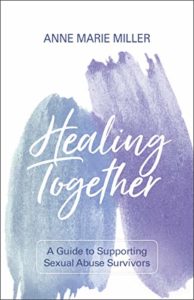Authoring five books between 2009 and 2015, Anne Marie Miller thought her days in the Christian publishing industry were over. After speaking at hundreds of churches, conferences and other events over the course of a decade, she got married, had a baby and entered nursing school.
That all changed in 2018, when Miller decided to turn in the man who sexually abused her as a teenager. Today she describes the aftermath, detailed in Healing Together: A Guide to Supporting Sexual Abuse Survivors, as “a blessed insanity.”
 The book, published in October by Zondervan, retells the story first made public by the Fort Worth Star-Telegram in July 2018 of Miller’s encounter with Mark Aderholt, a former Southern Baptist missionary, pastor and denominational executive who pleaded guilty to a sex crime and served 30 days in jail this July.
The book, published in October by Zondervan, retells the story first made public by the Fort Worth Star-Telegram in July 2018 of Miller’s encounter with Mark Aderholt, a former Southern Baptist missionary, pastor and denominational executive who pleaded guilty to a sex crime and served 30 days in jail this July.
Miller was a preacher’s kid and new in town when Aderholt helped her organize a See You at the Pole rally at her Dallas high school. It failed miserably, and he invited her to his apartment to talk and pray. While watching a movie together, he held her hand.
Over months the relationship between the “clueless” 16-year-old and 25-year-old seminary student escalated to passionate kissing and intimate contact both above and below the waist. He broke up with her in April of 1997, telling her he was getting engaged to a woman he knew from the mission field.
When she got older and realized she had been abused, Miller found on the Internet that Aderholt was serving as a missionary for a Christian organization. Encouraged by a friend, she gave permission for a third party to report the information to the Southern Baptist Convention’s International Mission Board.
The organization responded quickly and told her to relay all the details of her abuse she could remember. They confronted Aderholt and, to her surprise, he denied it.
Over the course of two months in 2007 Miller relived her trauma while answering intimate questions during an internal IMB investigation, including suggestions that she may have been partly responsible for her own abuse. Investigators eventually concluded her accusation was credible and backed up by evidence. They asked her if she wanted to press charges, and in her emotional state she said no.
In 2008 Miller received an e-mail informing her that Aderholt was no longer employed by the IMB and did not appeal their decision. Assuming that he was out of the ministry, she thought she had heard the last of it.
Later she found out that Aderholt was working at a Southern Baptist church as a pastor. She reached out to her contact at the IMB asking how, after what he did, Aderholt could be a pastor at an SBC church. She never got an answer.

Anne Marie Miller
In 2018 Miller learned that Texas has no statute of limitations for serious child sex crimes. She met with an attorney, who was a mandatory reporter. Police opened an investigation. Aderholt resigned as associate executive director and chief strategist for the South Carolina Baptist Convention, was indicted for sexual assault of a minor and pleaded guilty to a reduced charge in exchange for a lighter sentence.
Miller’s decision to go public with her story prompted a review of IMB policies by an independent third party.
“Because Mark had served overseas in Eastern Europe and had taken several trips – at least one solo – to Southeast Asia, I knew he had access to vulnerable people,” Miller says in the book. “I was even told he worked directly with victims of sex trafficking.”
“I want to believe I was his only victim, and maybe I am,” she writes. “But the Christian organization had never investigated his ministry, and in fact, I learned he was never terminated at all – he resigned. The organization knowingly allowed me to believe he was fired.”
Speaking with survivors and their loved ones, Miller saw the need for a practical guide to help supporters of sexual abuse survivors understand the basics of abuse, trauma, healing and hope. Drawing from her own experience and evidence-based research, she decided to write a guide outlining the basics of how to help someone who has suffered the trauma of sexual abuse.
“As I looked around for similar resources, I became even more convinced that there is a massive need for a resource developed for the average person out there – the mom or dad, aunt or niece, teammate or roommate, the butcher or baker or candlestick maker – who wants to support a loved one who has survived sexual abuse,” Miller said.
“We can’t leave the responsibility for care to the professionals or even the church because a lot of survivors won’t reach out to a counselor or step back into a church,” she said. “We need something to help the typical friend or family member understand what abuse is and how to support someone who has gone through it.”
Miller says Healing Together is not an in-depth study or theological exploration but “a basic guide to help people walk with survivors of sexual abuse or misconduct.” It mentions organizations, including the SBC, by name.
“We should not care what ‘the world’ would think about ‘the church’ when abuse is revealed. Instead we should care about what Christ thinks about abuse in his church.”
“This is not an attempt to tear down this denomination, harm the church or bring shame on people,” she said. “Jesus does not need to uphold his reputation. We should not care what ‘the world’ would think about ‘the church’ when abuse is revealed. Instead we should care about what Christ thinks about abuse in his church. Hiding abuse is hypocritical. Bringing it to light is not. The Bible instructs us to expose evil deeds of darkness instead of hiding or participating in them” (Ephesians 5:11).
Miller said Nov. 11 by e-mail she is overall encouraged by reviews on publisher sites and social media. “It seems as if the book has been helpful for pastors, supporters of survivors and survivors,” she said.
At the same time, Miller said she finds it “incredibly interesting” that many Christian media outlets who covered her previous books “have not touched this,” claiming a variety of reasons.
“Whether or not the book is considered ‘successful’ by industry standards is not a concern of mine,” she said. “I am proud of the resource I wrote, I am grateful for Zondervan publishing it, and I continue to move forward in my nursing career and education to work with survivors of sexual abuse and assault as a medical professional.”
Miller said she is encouraged by initial steps the Southern Baptist Convention has taken to address sexual abuse and recognizes the challenge of enforcing a zero-tolerance policy that respects the autonomy of the local church.
“I’ve seen good things take place when allegations are brought to light, and I’m grateful for mainstream media and their courage to print the truth with integrity,” she said. “As previously stated, many Christian media outlets are lukewarm in reporting, and we’ve seen how the fear of potential lawsuits masters what they choose to print.”
“As far as my own situation, while I was largely discouraged by the IMB’s action and inaction early on, I had a recent conversation with the IMB president, Paul Chitwood, which was quite healing for me and for the first time, I felt as if they were stepping into the role of ‘compassionately caring for survivors,’” she said.
“This is only the beginning of what should have been an obvious path within Protestant denominations,” Miller said. “It is mindboggling to me how self-proclaimed Christians can have such archaic and unbiblical views of abuse.”
Previous stories:
Former Southern Baptist official charged with sexual assault pleads guilty to lesser crime
Amid #MeToo fallout, Southern Baptist males quietly leaving jobs
Abuse arrest turns #MeToo spotlight on SBC International Mission Board
IMB president announces independent investigation into agency’s handling of alleged abuse
Interim IMB president says investigation into handlinhg of abuse allegations will continue
Survivor says SBC leaders’ response to abuse revelations little help to victims
As Southern Baptists grapple with #MeToo culpability, an abuse survivor seeks to pay her bills
